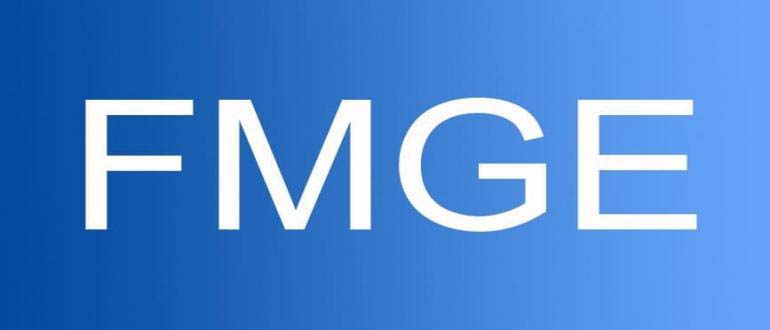
Foreign Medical Graduate Examination 2020
The word FMGE signifies Foreign Medical Graduate Examination, a national level examination which is conducted basically for Indian students who have a qualification from the foreign university and are keen to pursue their practices in India. FMGE is carried out by the National Board of Examinations (NBE), a body that is under the Ministry of Health & Family Welfare. FMGE also is known as the Medical Council of India (MCI) Screening Test.
It is important for those students who pursued their MBBS from Abroad and want to practice in India. The MCI Screening Test was first brought in the year 2002 for the Indian students who have a degree of medicine from the nation other than India, for example, Russia, Ukraine, Kyrgyzstan, China, Bangladesh and so on. The Medical Schools should be in the WHO International Directory of Medical Schools list.
FMGE 2020 conducted twice a year ie. June and December.
The MCI test arrangement has settled names in this field by the committed group of employees.
This screening test counts to be the most critical especially for the Indians who have completed their degree from distinctive medical universities overseas.
From India itself, more than 10000 of the students choose to study in foreign countries to pursue a course in the field of medication. The MCI screening test for the medical students who have been moved on from the remote colleges is led two times per year in the long stretches of June and December. Passing marks of 50% are required from candidate end in all the papers and an attempt of only 3 is given to the candidate. Once we qualify the exams a permanent registration certificate with MCI or FMGE is provided to us.
MBBS in Abroad from MCI recognized universities offer low fee structure options, Indian students, for courses as MBBS in Russia/Europe. MBBS in abroad is a great option for students as the quality of education in foreign universities is exceptionally high, so most of the Indian students dream about getting admission in MBBS in Abroad. After studying medicine from abroad the students needs to clear the FMGE test to practice in Indian hospitals.
FMGE 2020 Application Form
Details for FGME 2020 application form:
- Candidate can fill their application form on the official website via online mode.
- The application form will be available in October for the year 2020
- The application form will be started from the second week of October 2020 for the December session & in May for the April session.
- Candidates should fill all the details like personal details and academic details correctly in the application form.
- Candidates must upload the signature and passport-sized photo in the form.
- After the candidate once submits the application form, no correction facility will be provided to the candidates.
- Candidates can fill their application form till the first week of November 2020.
- Candidates should take a printout of the application form for further admission procedure.
- After the submission of the application, candidates will have to submit some important photocopies of documents to the authority (NBE) by email.
FGME 2020 Syllabus
FMGE 2020 Syllabus is prescribed by the National Board of Examinations (NBE). Candidates who have studied undergraduate medicine from outside India, and need to appear in FMGE 2020 should understand its syllabus to prepare for it.
Anatomy:
- General Anatomy
- Embryology
- Histology
- Human Genetics
- Radiological Anatomy
- Elements of Anatomy
- Regional Anatomy
- Surface Anatomy
- Sectional Anatomy
Physiology:
- General Physiology
- Skin and Body temperature
- Endocrine Glands
- Reproduction
- Cardiovascular System
- Respiratory System
- Body fluids – Blood
- Nerve and Muscle
- Gastrointestinal Tract
- Kidney
- Central Nervous Systems
- Special Senses
Biochemistry:
- Cell and Sub-cellular structures
- Carbohydrate Metabolism
- Lipid Metabolism
- Protein and Amino Acid Metabolism
- Hydrogen Ion concentration Acid, Bases, Buffers, Handerson-Haselbach equation
- Nuclear Acids
- Enzymes
- Vitamins
- Biological Oxidation
- Digestion and Absorption from GI Tract
- Intermediary Metabolism
- Purine and Primidine Metabolism
- Minerals
- Biochemical Genetics and Protein Biosynthesis
- Isotopes and their Application
- Carbohydrates
- Amino Acids, Peptides and Proteins
- Lipids
- Tissue Biochemistry
- Liver Functions
- Nutrition and Energy Metabolism
Pathology:
- Cell injury
- Nutritional and other disorders
- Genetic disorder
- Haematology
- Cardiovascular Pathology
- Respiratory Pathology
- Pathology of Kidney and urinary Tract
- Hepato-Biliary Pathology
- Lymphoreticular System / Spleen
- Reproductive System (male & female)
- Inflammation and Repair
- Immunopathology
- Infectious diseases
- Circulatory disturbances
- Growth disturbances and Neoplasia
- Diseases of the Breast
- Musculoskeletal System
- Endocrine pathology
- Neuropathology
- Dermato-Pathology
- Ocular Pathology
Microbiology:
- General Microbiology
- Systemic Virology
- Mycology
- Parasitology
- Immunology
- Bacteriology
- General Virology
- Clinical / Applied Microbiology
Pharmacology:
- General Pharmacology
- Autonomic Nervous System
- Gastro-intestinal System
- Endocrine pharmacology
- Central Nervous System
- Psychopharmacology
- Drugs in Anaesthetic practice
- Chemotherapy
- Cardio-vascular System
- Diuretics
- Drugs affecting blood and blood formation
- Autocoids and related drugs
- Respiratory System
- Toxicology
- Clinical Pharmacology and Rational drug use
Forensic Medicine:
- Definitions
- Courts of India
- Medico-legal autopsies
- Mechanical injuries and wounds
- Biological fluids
- Seminal stains
- Forensic Psychiatry
- Examination of an injury case
- Injuries due to physical agents & their medico legal importance
- Asphyxial death
- Death due to malnutrition, neglect battered babies
- Court procedures
- Medical Certifications & medico-legal reports including dying declaration
- Death
- Changes after death
- Inquest by police, magistrate and coroner
- Identification
- Examination of mutilated human remains
- Dowry death
- Virginity, sexual offences, sexual perversions
- Legitimacy
- Pregnancy and delivery
- Infanticide
- Medical Jurisprudence
- Toxicology
Clinical Subjects
General Surgery:
- Hemorrhage and shock
- Lymphatic and Lymph nodes
- Wounds
- Specific and non-specific injections
- Tumors, Cysts, Ulcers and Sinuses and Fistulae
- Infections of Hand and Foot
- Diseases of muscle, tendons, bursae and fascia
- Hernia
- Fluid, electrolyte and Acid balance, nutrition
- Skin tumours, burns, skin grafting
- Arterial diseases
- Venous diseases
- Umbilical granuloma, fistula, adenoma
- Abdominal Wall
- Face, Teeth, Gums, Mouth, Tongue, Salivary glands, Neck
- Thyroid Glands, Thyroglossal Tract and Endocrines
- Breast
- Sympathetic System
- Cranio-Cerebral injuries
- Brain, Nerves
- Genito-Urinary System
- Kidneys and Ureters
- Urinary Bladder
- Prostrate
- Urethra
- Penis, Testis and Scrotum
- Vasectomy and Recanalisation
- Cardiothoracis System
- Oesophagus, Stomach and Duodenum
- Spleen, Liver, Gall Bladder and bile ducts
- Pancreas
- Peritoneum
- Intestines, intestinal obstruction
- Appendix
- Rectum and Anal Canal
Anesthesia:
- Anatomy of upper airway
- Physiology of Respiration O2/CO2 transport. Methods of oxygen therapy.
- Pre-operative evaluation/pre-medication
- Anaesthetic agents, stages of Anaesthesia
- Cardiopulmonary resuscitation basic, use of simple ventilators
- Monitoring
- ICU, role of anaesthesiologist in ICU
- Shock
- Blood Transfusion and Fluid Electoral Balance
- Sites of respiratory obstruction and management of airway in an unconscious patient
- Principles and mechanism of administration of general anaesthetics, balanced Anaesthesia
- IPPV, Endotracheal Intubations
- Muscle Relaxants
- Spinal/Epidural Anesthesia
- Local Anesthesia
- Poisoning
- Role of anaesthesiologist in acute and chronic relief.
Radio- Diagnosis:
- Gastrointestinal System
- Obstetrics &Gynaecology
- Respiratory System
- Cardiovascular System
- Skeletal System
- Central Nervous System
- Excretory System
Radiotherapy:
- Prevention and Early diagnosis of Cancer
- Paediatrics Principles of Nuclear medicine
- Common radiation reactions and management
- Principles of Radiotherapy
- Principles of Chemotherapy
- Radiotherapy and chemotherapy in commonly seen cancers
- Radio-isotopes in diagnosis and therapy


Comment (0)
Leave a comment